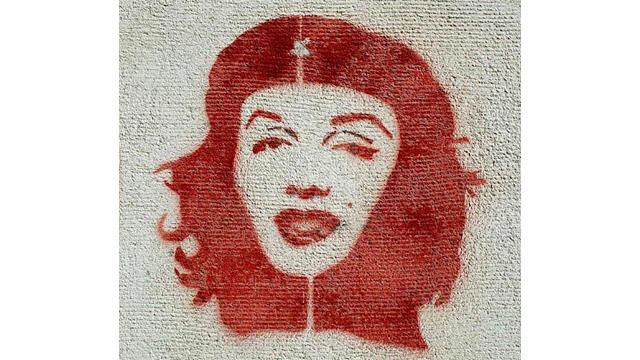
Photo: Thomas Locke Hobbs.
Marilyn Monroe. Arguably the most famous alliterative name in Hollywood history, it’s one that conjures up other alliterative pairings: she’s our all-American blond bombshell and sex symbol, one best captured in her iconic image as Lorelei Lee, the campy prototype of Madonna's equally campy "Material Girl." But perhaps there might be yet another pairing: populist progressive.
On the fiftieth anniversary of her passing, let's take a new look at the woman whom Ella Fitzgerald praised as "an unusual woman—a little ahead of her times." A star, according to Carl Sandburg, who was "not the usual movie idol" but had “something democratic about her": the very type "who would join in and wash up the supper dishes even if you didn't ask her."
That Monroe was no mere conflation of her diamond- and gold-digging protagonists from "Gentlemen Prefer Blondes" and "How to Marry a Millionaire" was already apparent from her open support for playwright Arthur Miller in 1956: he had just been subpoenaed by the House Committee on un-American Activities (a committee which he had already allegorized in his play, "The Crucible") and ordered to discuss political activities and name names. While some in Hollywood prudently gave in to HCUA heat - most notably, director and “Method actor” Elia Kazan - others didn’t. Although it might be a stretch to claim that Monroe liked it hot, she had few qualms about dismissing the studio executives who advised her to steer clear of Miller: “Some of those bastards in Hollywood wanted me to drop Arthur. Said it would ruin my career. They’re born cowards.” So what if she had to start all over again? Fame was something which she had experienced, “but that’s not where I live.” Even months before her death, Monroe was undeterred by any anxieties as she continued to consort with Americans tarred by the FBI as communists, including Frederick Vanderbilt Field.
When it came to race, class, or sex, Monroe was also well ahead of the curve: after all, her personal library (one comprised largely of literary and political classics) already boasted such titles as De Tocqueville’s Democracy in America, Ellison’s Invisible Man, Marx’s Capital, and Paine’s Rights of Man. She convinced the owner of Hollywood's famous Mocambo club to book their first black performer, Ella Fitzgerald, for a week while promising to sit in the front row as publicity. She admired Eleanor Roosevelt for her "devotion to mankind." She championed John F. Kennedy and his brother Robert because "they symbolize the youth of America - in its vigor, its brilliance, and its compassion": together, they discussed the H-bomb, which she regarded as a "nightmare." She was ecstatic for Carl Sandburg’s poems because they “are songs of the people by the people and for the people."
And perhaps because she was inexplicably underpaid relative to other stars, she rooted for "the individual as opposed to the corporation" because “the way it is the individual is the underdog, and with all the things the corporation has going for them the individual comes out banged on her head. The artist is nothing." Monroe deplored double standards where "executives can get colds and stay home forever and phone it in, but how dare you, the actor, get a cold or a virus." In short, according to a daughter of her last psychiatrist, Monroe was "passionate about equal rights, rights for blacks, rights for the poor. She identified strongly with the workers." (The latter was quickly borne out by her dumping of Miller after he broke ranks with the Writers’ Union in 1960.)
Not least, she lambasted those critical of Montgomery Clift's sexuality: "People who aren't fit to open the door for him sneer at his homosexuality. What do they know about it? Labels--people love putting labels on each other....People tried to make me into a lesbian. I laughed. No sex is wrong if there's love in it." (Hear that, Chick-fil-A?)
Certainly, Monroe’s compassion for the weak and vulnerable emerges most fittingly in what would be her final film, "The Misfits": a Western with a screenplay penned by Miller and inspired by her own idealism. Her seven-year-itch for a role more challenging than that of a gold-digger would be at least partially fulfilled in her new, diametrically different role as a woman who persuades her lover (played by Clark Gable) and friends (Montgomery Clift and Eli Wallach) to do the right thing. After discovering that they plan to corral a few undersized wild mustangs - the eponymous "misfits"- in order to sell them to dog food manufacturers, she draws immediate attention to their hypocrisy and double standards: “Killers! Murders! You liars! All of you liars! You're only happy when you can see something die!...You and your God's country! Freedom!” Moved by her outrage and sorrow, the men eventually free the mustangs.
But perhaps it's wisest to let her have the last word on her politics - words unfortunately struck from an interview published shortly before her death. She was indeed “something beyond the sexual/ More than just our Marilyn Monroe” as Elton John once sang.
"What I really want to say: that what the world really needs is a real feeling of kinship. Everybody: stars, laborers, Negroes, Jews, Arabs. We are all brothers. Please don't make me a joke. End the interview with what I believe."
Frances A. Chiu earned her doctorate at Oxford University and is an assistant professor at The New School.
3 WAYS TO SHOW YOUR SUPPORT
- Log in to post comments











